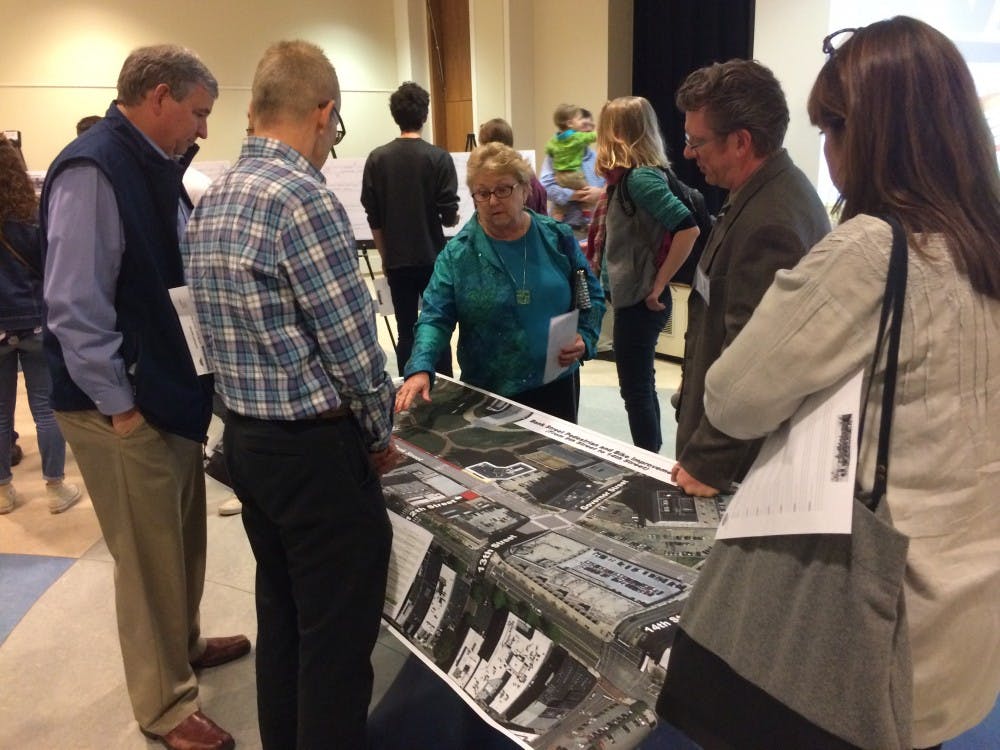Editor's note: The Collegian was told after publishing that Tuesday's event was a City of Richmond-sponsored meeting. Bike Walk RVA is an advocacy organization that assisted with public engagement and outreach. The bike-lane initiative is that of DPW. Mike Sawyer is the City Transportation Engineer, not a Bike Walk RVA leader.
Bike Walk RVA, a local advocacy group seeking to expand Richmond’s network of bike lanes, held its second open forum in the Richmond Public Library last Tuesday.
The meeting was open to the public and was attended by a mix of involved city officials, interested residents and avid cyclists wearing full bike suits and helmets.
Instead of presenting a PowerPoint, the initiative’s organizers set up stations around the library auditorium and made themselves available to anyone with questions or concerns about the program. The program, which plans to construct 25 miles of bike lanes throughout the city of Richmond, is expected to cost $1 million, 50 percent of which will be subsidized by the state. The other 50 percent will be paid for by the city.
Jakob Helmboldt, the city’s pedestrian bicycles and trails coordinator, led the meeting and presented plans for bike lanes on Patterson and Malvern avenues. He told attendees that the Bike Walk RVA project was affiliated with the RVA Green sustainability initiative.
“RVA Green is looking at transportation in a more comprehensive and holistic way,” Helmboldt said. “The sustainability initiative and Bike Walk RVA are on parallel paths, but they also overlap.”
Both movements are trying to get more people to use public transportation by attempting to convince them to ride their bikes, Helmboldt said.
The conceptual-design phase for the Bike Walk RVA project started back in November and sought to get public feedback that identified concerns early, so that when more finalized plans were presented those concerns had already been addressed.
Mike Sawyer, one of Bike Walk RVA’s lead coordinators, explained to the crowd why Richmond residents should look forward to the increased connectivity that bike lanes would bring.
“Everyone looks from a front-door perspective,” Sawyer said. “I think what ultimately sells people on this is that a healthy street increases property value and makes the walking experience a lot better.”
Sawyer went on to say that the bike-lane program was working in conjunction with the city’s “Vision Zero” initiative, which is a product of last year’s Complete Streets policy, a resolution that requires the city to consider bicyclists and pedestrians when planning future projects.
“Vision Zero states that by the year 2030, deaths and serious injuries on city streets be cut in half with the ultimate vision of getting to zero,” Sawyer said. “It’s all about safety. There were 2,500 injuries and deaths last year on Richmond-city streets, so there’s still a ways to go.”
Enjoy what you're reading?
Signup for our newsletter
Unfortunately, the Bike Walk RVA bike-lane program will not reach as far as the University of Richmond, because parts of campus are outside city limits. However, UR students can still access the program once they're off campus.
Zach Halaschak, RC '17, was critical of the city’s existing transit system and expressed interest in its expansion.
“It doesn’t seem like Richmond currently has a good system in place in terms of public transportation,” Halaschak said. “It would be nice to see any sort of improvement that could help those living in the city.”
Despite the overwhelmingly popular support for the city’s increased emphasis on sustainable transportation and bike lanes specifically, some Richmond residents have concerns about Bike Walk RVA’s ability to coordinate this project with other municipal departments.
Col. Steven Pike, chief of the Division of Capitol Police in Richmond, expressed reservations about new bike lanes being painted over existing potholes. Col. Pike said that he managed a force of 75 officers, many of whom were mounted on bicycles, and he worried that his officers would be at risk of injuring themselves if these potholes were not filled in before the bike lanes were constructed.
Helmboldt was fairly dismissive about the colonel’s pothole fears in terms of how they compared to other obstacles the bike program has faced.
“Typically that’s not going be one of the bigger [problems],” Helmboldt said. “It’s typically more issues of ‘how's this impacting the street that I live on’ or ‘how does this affect traffic.’”
Contact reporter Dan Mahoney at dan.mahoney@richmond.edu.
Support independent student media
You can make a tax-deductible donation by clicking the button below, which takes you to our secure PayPal account. The page is set up to receive contributions in whatever amount you designate. We look forward to using the money we raise to further our mission of providing honest and accurate information to students, faculty, staff, alumni and others in the general public.
Donate Now



